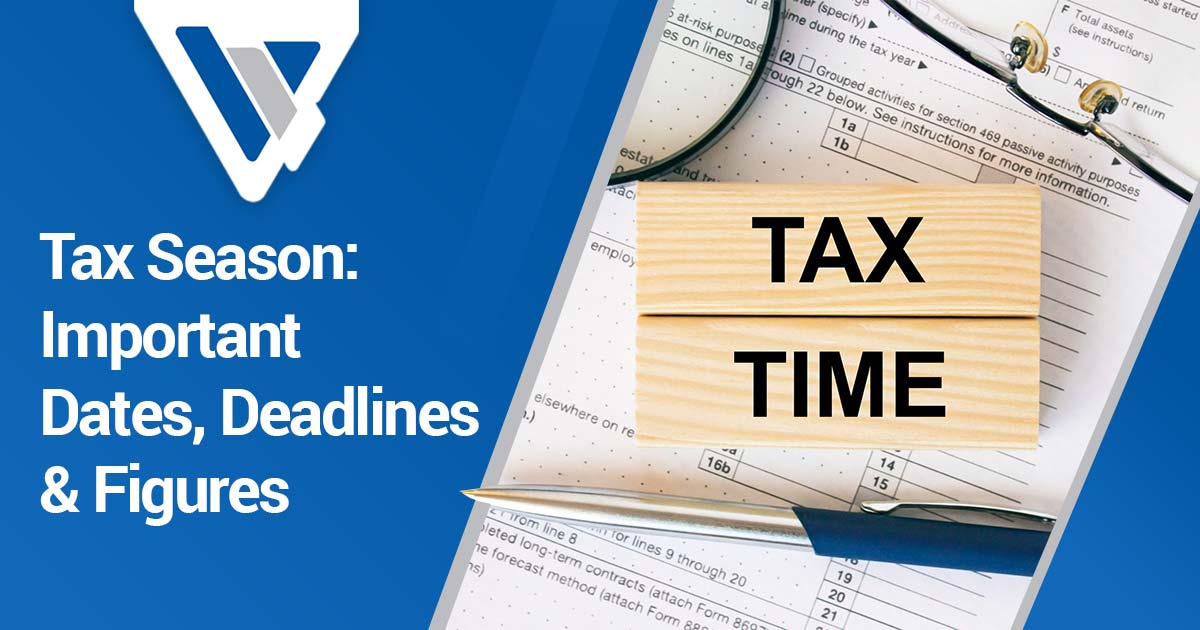I am sharing with you some of the information the Life Insurance Marketing and Research...


It’s hard to believe that tax season is here already. In an effort to help our clients be prepared, we wanted to make sure you are informed of important dates and items to consider when preparing to file your taxes.
While there has been no indication that the IRS is going to push back the April 18, 2022 tax due date, this doesn’t mean everything is guaranteed to go smoothly or that no delays will happen on the agency’s end. The pandemic, IRS shutdowns and backlogs, along with changes to unemployment benefits, stimulus money and the child tax credit continue to create challenges for the IRS. The agency recently announced that as of December 18, 2021, there were still 6.3 million unprocessed tax returns including 2020 filings with stimulus check errors.
There are important steps you can take to help ensure that your tax return and refund do not face processing delays. The IRS recommends that you file your return electronically, opt for direct deposit or online payments instead of mailing a check, and reconcile the stimulus and advance child tax credit payments received to ensure you report the correct numbers.
This document includes information on tax law changes that may impact your 2021 tax return. We will continue to provide timely updates on any new changes or updates that may impact your tax situation. If you have any questions, please give our office a call at (817) 717-3812 or email Prestyn at ptillotson@virtuswealth.com.
The CARES Act introduced a new deduction on your 2020 taxes up to $300 per tax year for charitable contributions even if you took the standard deduction. On your 2021 taxes, taxpayers who take the standard deduction may take a deduction up to $300 per person for cash contributions to qualified charities (non-cash contributions are excluded). This means married filing joint filers can deduct up to $600 in addition to the standard deduction. This provision is now permanent and will remain in effect for future years.
The CARES Act and the Consolidated Appropriations Act (CAA) (signed into law on December 27, 2020) temporarily suspended limits on charitable contribution deductions for the 2020 and 2021 tax years. The new legislation also increased the accuracy penalty from 20% to 50% for any overstatement of qualified charitable contributions, reinforcing the need for receipts and proper record retention.
The American Rescue Plan increased this credit amount in 2021 to $3,600 per child under the age of 6 and $3,000 per child 16 years or younger (previously $2,000). Advance payments of this credit were automatically distributed to qualifying taxpayers during the second half of the 2021 calendar year. The amount received in advance may reduce the amount you typically write-off at tax time, possibly triggering a bill due come this April. Any balance you may be owed can still be claimed on your tax refund. Given the complexity of the calculation for this credit, you may not know exactly where you fall until you actually file your taxes. We recommend preparing your taxes early to avoid any surprises.
If you received this credit in advanced payments you should also receive IRS Letter 6419, mailed out in December. Report amounts received on your 2021 tax return and keep this letter with your records.
If you have a health flexible spending account, or FSA, the limit for tax-free contributions increased to $2,850 – up $100 from last year.
The LPL mailing schedule for your tax statements is listed below. In order to meet all IRS deadlines, reduce errors, and reduce the need to mail corrected versions, 1099 Consolidated statements will be mailed in phases. Timeliness and accuracy remain a priority. Last year, LPL achieved an industry-leading correction rate of 1%.
| 2022 MAILING DATES | DESCRIPTION |
| January 31 | Form 1099-R & Form 1099-Q |
| January 21 & 28 | First wave of 1099 Consolidated Forms Mailing Includes accounts with the simplest tax information and not subject to income reclassification |
| February 4, 11, 18 & 25 | Second wave of 1099 Consolidated Forms Mailing Includes accounts holding more complex securities that may be subject to income reclassification |
| February 18 | Preliminary 1099 Consolidated Form DRAFT COPY Includes accounts holding more complex securities that may be subject to income reclassification |
| March 4, 11, & 18 | Third wave of 1099 Consolidated Forms Mailing In the event that investment companies do not furnish tax information to LPL in time for the February mailing deadlines |
The following deadlines are for calendar year filers. The deadlines for partnerships and corporations that follow a fiscal year calendar vary, consult your tax professional for more information.
| Partnerships | March 15th | Deadline to file your return (IRS Form 1065) or file for an extension (IRS Form 7004) |
| September 15th | Deadline to file your return if an extension was requested | |
| S corporations | March 15th | Deadline to file your return (IRS Form 1120-S) or file for an extension (IRS Form 7004) |
| September 15th | Deadline to file your return if an extension was requested | |
| Trusts and Estates | April 18th | Deadline to file your return (IRS Form 1041) or file for an extension (IRS Form 7004) |
| September 30th | Deadline to file your return if an extension was requested | |
| Individuals | April 18th | Deadline to file your return (IRS Form 1040) or file for an extension (IRS Form 4868) |
| October 17th | Deadline to file your return if an extension was requested | |
| C corporations | April 18th | Deadline to file your return (IRS Form 1120) or file for an extension (IRS Form 7004) |
| October 17th | Deadline to file your return if an extension was requested |
Note: the individual filing deadline for residents of Maine or Massachusetts is April 19th due to the Patriots’ Day holiday in those states. Contact your tax professional if you reside in those states and have questions.
The standard deductions for 2021 federal taxes filed in 2022 are reflected in the chart below. Note the additional standard deduction applies to each spouse, so if both spouses are over the age of 65 (and not legally blind) their additional standard deduction is $2,700.
| Standard Deductions | ||
| Filing Status | 2021 | 2020 |
| Married Filing Jointly | $25,550 | $24,800 |
| Head of Household | $18,800 | $18,650 |
| Single | $12,550 | $12,400 |
| Married Filing Separately | $12,400 | $12,200 |
| Dependent | Greater of $1,100 or
$350 + earned income |
No Change |
| Additional standard deduction for the blind and filers over the age of 65 | ||
| Single & Head of Household | $1,700 | $1,650 |
| All others | $1,350 | $1,300 |
The chart below reflects the 2021 federal income tax brackets for taxes due in 2022.
| Tax Brackets | ||||
| Tax Rate | Single | Married Filing Jointly | Married Filing Separate | Head of Household |
| 10% | $0-$9,950 | $0-$19,900 | $0-$9,950 | $0-$14,200 |
| 12% | $9,951-$40,525 | $19,901-$81,050 | $9,951-$40,525 | $14,201-$54,200 |
| 22% | $40,526-$86,375 | $81,051-$172,750 | $40,526-$86,375 | $54,201-$86,350 |
| 24% | $86,376-$164,925 | $172,751-$329,850 | $86,376-$164,925 | $86,351-$164,900 |
| 32% | $164,926-$209,425 | $329,851-$418,850 | $164,926-$209,425 | $164,901-$209,400 |
| 35% | $209,426-$523,600 | $418,851-$628,300 | $209,426-$314,150 | $209,401-$523,600 |
| 37% | $523,601+ | $628,301+ | $314,151+ | $523,601+ |
Here are some important items to consider as you begin receiving your tax documents.
Schedule K-1’s are used by pass through entities and document income distributed to you during the tax year. So, you will receive a K-1 if you are a partner or shareholder in a pass-through entity (like a Master Limited Partnership). Realize, too, that you might receive a K-1 form if you are invested in a fund or an Exchange Traded Fund that operates as a partnership.
The tricky part for you with a K-1 is timing. Unlike 1099 and W-2 forms, which are due to the taxpayer by the end of January (mid-February at the latest), a K-1 isn’t due until mid-March because businesses need more time to file their tax returns.
Please be aware that you may receive a Corrected 1099 after your initial 1099 due to income reclassification. Income reclassification refers to changes that security issuer companies (such as outside banks and institutions) make to all or part of previously reported distribution income to some other tax classification. Your annual 1099 tax statement reports are received from these outside issuer companies. After issuers complete year-end audit and reporting processes, this information may change, which is referred to as income reclassification. This information is then applied to accounts that are impacted by the securities changes and a new 1099 statement is generated and mailed in the next correction mailing.
Similar to other major financial firms’ standard protocols and delivery, 1099 Consolidated statements are mailed in waves as information is received from various institutions. For certain security types, final tax information from the bank, institution, or other type of issuer may be received after the standard deadline, resulting in your statement not arriving on the anticipated February date. In these cases, the statement will be mailed on March 5 or March 12, 2021.
Tax statement corrections due to income reclassifications are more likely for certain investments including:
— Regulated investment companies (mutual funds)
— Unit investment trusts (UITs)
— Real-estate investment trusts (REITs)
— Widely-held fixed investment trusts (WHFITs)
Unfortunately, there’s no IRS cutoff or deadline for providing corrected 1099 forms. If you need to file an amended tax return, it’s recommended that you discuss the situation with your tax advisor prior to refiling so you can determine the best course of action based on your individual circumstances.
Note: Reclassification is an industry-wide activity. All financial industry firms receive reclassified data from the issuers.
It’s always a good idea for you to maintain an open line of communication with us and your tax advisor throughout the year in order to ensure appropriate tax strategies. This dialogue can help you decide if filing an extension is the best course of action. There are many reasons why filing an extension might make sense. For example, the volume of data or complexity of certain transactions inside or outside your accounts may require additional time to address. Also, if you are expecting to receive your 1099 in the fourth mailing wave in March, it may be reasonable to consider filing an extension to allow sufficient time for their tax advisor to accurately complete their tax return forms.
This information is not intended to be a substitute for specific individualized tax advice. We suggest that you discuss your specific tax issues with a qualified tax advisor.